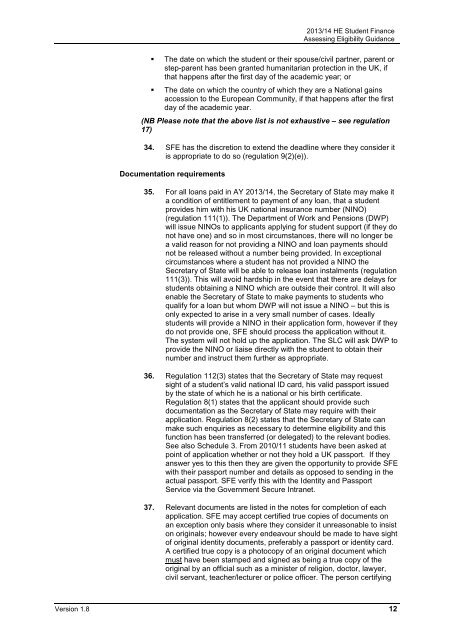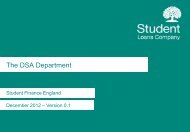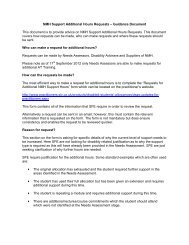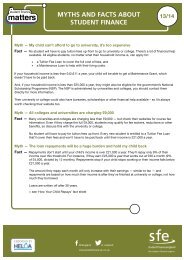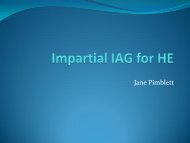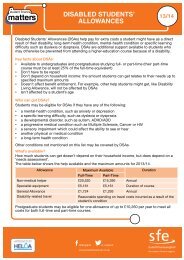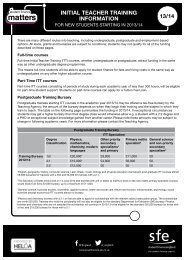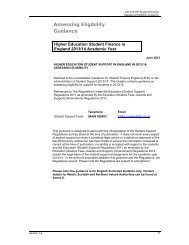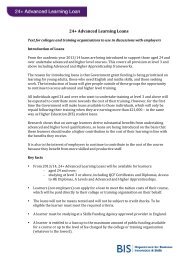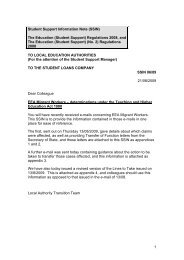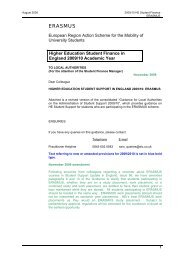SFE Assessing Eligibility Guidance 2013/14 - Practitioners - Student ...
SFE Assessing Eligibility Guidance 2013/14 - Practitioners - Student ...
SFE Assessing Eligibility Guidance 2013/14 - Practitioners - Student ...
Create successful ePaper yourself
Turn your PDF publications into a flip-book with our unique Google optimized e-Paper software.
<strong>2013</strong>/<strong>14</strong> HE <strong>Student</strong> Finance<br />
<strong>Assessing</strong> <strong>Eligibility</strong> <strong>Guidance</strong><br />
• The date on which the student or their spouse/civil partner, parent or<br />
step-parent has been granted humanitarian protection in the UK, if<br />
that happens after the first day of the academic year; or<br />
• The date on which the country of which they are a National gains<br />
accession to the European Community, if that happens after the first<br />
day of the academic year.<br />
(NB Please note that the above list is not exhaustive – see regulation<br />
17)<br />
34. <strong>SFE</strong> has the discretion to extend the deadline where they consider it<br />
is appropriate to do so (regulation 9(2)(e)).<br />
Documentation requirements<br />
35. For all loans paid in AY <strong>2013</strong>/<strong>14</strong>, the Secretary of State may make it<br />
a condition of entitlement to payment of any loan, that a student<br />
provides him with his UK national insurance number (NINO)<br />
(regulation 111(1)). The Department of Work and Pensions (DWP)<br />
will issue NINOs to applicants applying for student support (if they do<br />
not have one) and so in most circumstances, there will no longer be<br />
a valid reason for not providing a NINO and loan payments should<br />
not be released without a number being provided. In exceptional<br />
circumstances where a student has not provided a NINO the<br />
Secretary of State will be able to release loan instalments (regulation<br />
111(3)). This will avoid hardship in the event that there are delays for<br />
students obtaining a NINO which are outside their control. It will also<br />
enable the Secretary of State to make payments to students who<br />
qualify for a loan but whom DWP will not issue a NINO – but this is<br />
only expected to arise in a very small number of cases. Ideally<br />
students will provide a NINO in their application form, however if they<br />
do not provide one, <strong>SFE</strong> should process the application without it.<br />
The system will not hold up the application. The SLC will ask DWP to<br />
provide the NINO or liaise directly with the student to obtain their<br />
number and instruct them further as appropriate.<br />
36. Regulation 112(3) states that the Secretary of State may request<br />
sight of a student‟s valid national ID card, his valid passport issued<br />
by the state of which he is a national or his birth certificate.<br />
Regulation 8(1) states that the applicant should provide such<br />
documentation as the Secretary of State may require with their<br />
application. Regulation 8(2) states that the Secretary of State can<br />
make such enquiries as necessary to determine eligibility and this<br />
function has been transferred (or delegated) to the relevant bodies.<br />
See also Schedule 3. From 2010/11 students have been asked at<br />
point of application whether or not they hold a UK passport. If they<br />
answer yes to this then they are given the opportunity to provide <strong>SFE</strong><br />
with their passport number and details as opposed to sending in the<br />
actual passport. <strong>SFE</strong> verify this with the Identity and Passport<br />
Service via the Government Secure Intranet.<br />
37. Relevant documents are listed in the notes for completion of each<br />
application. <strong>SFE</strong> may accept certified true copies of documents on<br />
an exception only basis where they consider it unreasonable to insist<br />
on originals; however every endeavour should be made to have sight<br />
of original identity documents, preferably a passport or identity card.<br />
A certified true copy is a photocopy of an original document which<br />
must have been stamped and signed as being a true copy of the<br />
original by an official such as a minister of religion, doctor, lawyer,<br />
civil servant, teacher/lecturer or police officer. The person certifying<br />
Version 1.8 12


